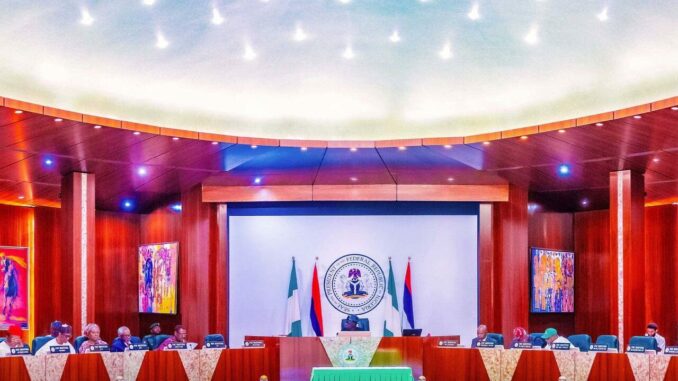
The Federal Executive Council, FEC on Monday October 16 proposed the sum of N26.01 trillion for the 2024 fiscal year to be submitted to the National Assembly.
The government said it was working towards ensuring that the January to December budget circle is maintained and that the 2024 budget is passed and signed before December 31, 2023.
The Minister of Budget and Planning, Atiku Bagudu, made the disclosure at the end of Council meeting presided over by President Bola Tinubu at the Council Chamber, Presidential Villa, Abuja.
Briefing State House correspondents at the end of the FEC, alongside his colleagues from the Ministry of Information and National Orientation, Mohammed Idris, Minister of Finance and Coordinating Minister of Economy, Wale Edun, Works Engr. Dave Umahi, Industry, Trade and Investment, Doris Uzoka-Anite, Labour and Employment, Simon Lalong as well as the Minister of State for Labour, Nkeiruka Onyejecha, Bagudu said Council has approved the 2024-2026 Medium Term Expenditure Framework, MTEF, and Fiscal Strategy Papers, FSP.
He explained that the executive is required by the Fiscal Responsibility Act to present to the National Assembly ahead of a budget presentation, a document which will provide the medium term economic outlook for the economy.
He said FEC made assumptions about the reference price for the price of crude oil which is at $73.96, exchange rate is put at $700, oil production of 1.78 million barrels per day.
Debt service N8.25 trillion while inflation is put at 21 percent and GDP growth at 3.76 percent.
He said, “Now, it was presented on the background of the commendable measures that have been taken since June in order to restore macroeconomic stability by particularly the deregulation of petroleum prices, which we maintained that subsidies are gone and indeed the regulation of the foreign exchange market.
“So Council deliberated, as well as the implication of this and all measures promised in the renewed hope agenda consumer credits, mortgages, mortgage, reversed or dismissed institution as well as funding the newly aligned institutional changes particularly ministries with specific functions that are able to generate growth so that would be better for our country.
